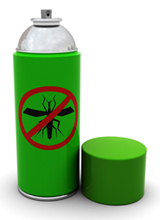Feature Story
Health Center Today, June 20, 2011
Beware of Bug Season
By Carolyn Pennington
 Mosquitoes, biting flies, and ticks can cause annoying bites and
sometimes a serious disease. Mosquito bites can spread infections such
as West Nile
virus, a virus that causes swelling of the brain (encephalitis),
and Eastern Equine Encephalitis (EEE). Tick bites can cause serious
diseases such as
Lyme disease and
Rocky Mountain spotted fever. Bites from biting flies are painful
and may cause a
skin infection.
Mosquitoes, biting flies, and ticks can cause annoying bites and
sometimes a serious disease. Mosquito bites can spread infections such
as West Nile
virus, a virus that causes swelling of the brain (encephalitis),
and Eastern Equine Encephalitis (EEE). Tick bites can cause serious
diseases such as
Lyme disease and
Rocky Mountain spotted fever. Bites from biting flies are painful
and may cause a
skin infection.
Dr. Kevin Dieckhaus, an infectious disease specialist, says this year could be worse than usual because of our snowy winter and wet spring. West Nile-carrying mosquitoes are usually found in urban and suburban areas. EEE-transmitting mosquitoes gravitate toward marshes, swamps and other large bodies of still waters, especially in the eastern part of the state. Of the two diseases, West Nile is the more common, but EEE is more deadly.
Ticks are another summertime hazard with Connecticut having one of the highest rates for Lyme disease.
Lyme Disease Awareness Tips:
- Remove ticks as soon as you notice them.
- Infected ticks usually don't spread Lyme disease until they have been attached for at least 36 hours.
- One sign of Lyme disease is a round, red rash that spreads at the site of a tick bite. This rash can get very large.
- Flu-like symptoms are also very common. People in the early stages of Lyme disease may feel very tired and have headaches, sore muscles and joints, and a fever.
- These symptoms can start at any time, from three days up to a month after you have been bitten. Some people don't have any symptoms when they are in the early stages of Lyme disease. And they may not even remember getting a tick bite.
- If Lyme disease goes untreated, you can have more serious symptoms over time. Swelling and joint pain (like arthritis), a lack of energy that does not get better, poor memory and weakness or paralysis in your face muscles.


